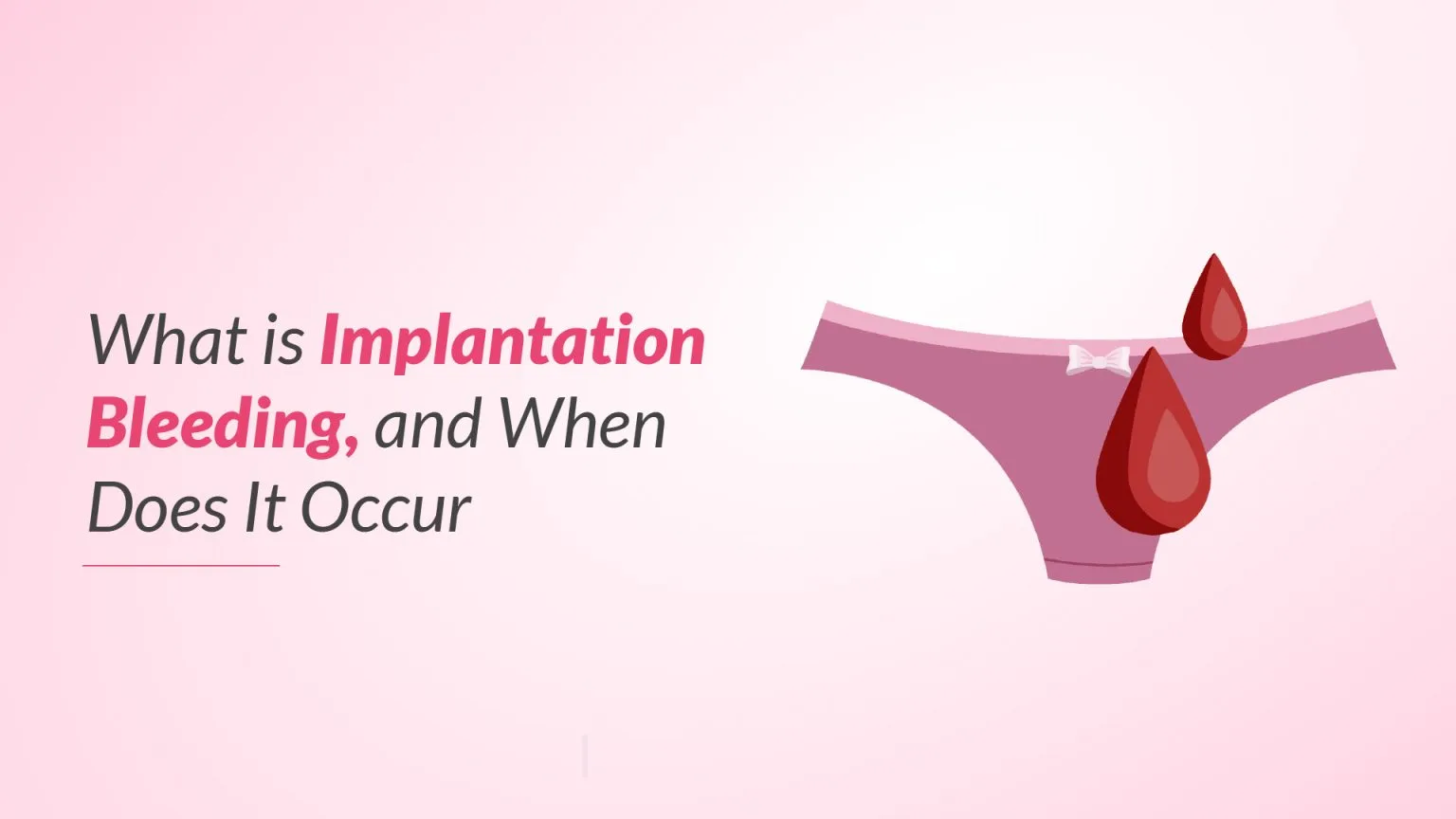Implantation bleeding is a medical condition that occurs in some women during the early stages of pregnancy. It is a light spotting or bleeding. It is often mistaken for a regular menstrual period. Understanding the signs and timing of implantation bleeding can help women trying to conceive or those who suspect they may be pregnant.
What is Implantation Bleeding?
Implantation bleeding is a light vaginal bleeding or spotting that occurs when the fertilised egg, or blastocyst, implants itself into the uterine lining. This process is a crucial step in the early stages of pregnancy, and it can cause a small amount of bleeding or spotting.
The implantation process involves the blastocyst burrowing into the uterine wall, which can cause minor damage to the blood vessels in the area. This leads to light bleeding or spotting, often mistaken for the start of a menstrual period.
Suggested Read: Implantation bleeding
When Does Implantation Bleeding Occur?
Implantation bleeding typically occurs 6 to 12 days after fertilisation, usually a few days before the expected menstrual period. However, the timing can vary from woman to woman and may occur earlier or later.
The timing of implantation bleeding is related to the ovulation cycle and the time it takes for the fertilised egg to travel the distance between the fallopian tube and the uterus and get implanted. This process usually takes about 6 to 10 days after fertilisation.
Suggested Read: Menstrual Cycle and Fertility
Symptoms of Implantation Bleeding
Implantation bleeding can have various symptoms, some of which may overlap with the signs of a regular menstrual period. However, there are some distinct characteristics that can help distinguish implantation bleeding from a period, such as:
Light Spotting
One of the most common symptoms of implantation bleeding is light spotting or bleeding. This bleeding is typically lighter than a regular period and may appear light pink, brown, or reddish-brown spotting.
Short Duration
Implantation bleeding is usually short-lived, lasting anywhere from a few hours to a few days. In contrast, a regular menstrual period typically lasts 3 to 7 days.
Mild Cramps
Some women may experience mild cramping or discomfort during implantation bleeding. However, these cramps are usually less intense than those associated with a regular period.
No Clotting
Implantation bleeding is typically free of clots, unlike a regular menstrual period, which may contain clots.
Timing in Cycle
Implantation bleeding occurs a few days before the expected menstrual period, usually around 6 to 12 days after ovulation.
Absence of PMS Symptoms
Women who experience implantation bleeding may not experience the typical premenstrual syndrome (PMS) symptoms, such as mood swings, bloating, or breast tenderness, that often accompany a regular menstrual period.
No Odor
Implantation bleeding is typically odourless, whereas menstrual blood may have a distinct odour.
Other Early Pregnancy Symptoms
Along with implantation bleeding, some women may experience other symptoms associated with pregnancy, like nausea, fatigue, breast tenderness, or increased sensitivity to certain smells.
Suggested Read: What if a missed period is still a negative pregnancy test?
Possible Reasons Behind Implantation Bleeding
Implantation bleeding is believed to occur due to the process of the fertilised egg implanting itself into the uterine lining. This process can cause minor damage to the blood vessels in the area, leading to light bleeding or spotting.
Other potential reasons for implantation bleeding include:
- Hormonal Changes: The surge of hormones (human chorionic gonadotropin (hCG) & progesterone) during early pregnancy can cause changes in the uterine lining, leading to implantation bleeding.
- Uterine Contractions: As the blastocyst implants, it can trigger mild uterine contractions, which may cause light bleeding.
- Immune Response: The body’s immune system may react to the blastocyst implantation, leading to inflammation and bleeding.
Suggested Read: Signs and Symptoms of Successful IVF Implantation
Duration and Flow of Implantation Bleeding
Implantation bleeding is typically much lighter & shorter in duration compared to a regular menstrual period. The flow may range from light spotting to a light flow, but it is generally not heavy enough to require pads or tampons.
The bleeding may last anywhere from a few hours to a couple of days, with the average duration being around 1 to 3 days. However, it’s important to note that the duration and flow can vary from woman to woman.
How is Implantation Bleeding Different from Period Blood?
Implantation bleeding differs from menstrual bleeding in several ways:
- Colour: Implantation bleeding is often lighter, ranging from light pink to brown or reddish-brown, while menstrual blood is typically bright red or dark red.
Suggested Read: What to Know About Period Blood Color?
- Flow: Implantation bleeding is usually much lighter in flow compared to a regular period. It may appear as spotting or a light flow, but it is generally not heavy enough to require pads or tampons.
- Duration: Implantation bleeding is of lesser duration, lasting anywhere from a few hours to a couple of days, while a regular menstrual period can last between 3 to 7 days.
- Clotting: Implantation bleeding is typically free of clots, whereas menstrual blood may contain clots.
- Cramping: Implantation bleeding may be accompanied by mild cramping or discomfort, but these cramps are usually less intense than those associated with a regular period.
- Timing: Implantation bleeding typically occurs a few days before the expected menstrual period, usually around 6 to 12 days after ovulation, while a regular period occurs at the expected time of the menstrual cycle.
- PMS Symptoms: Women who experience implantation bleeding may not experience the typical premenstrual syndrome (PMS) symptoms, such as mood swings, bloating, diarrhoea, or breast tenderness, that often accompany a regular menstrual period.
It’s important to note that while these differences can help distinguish implantation bleeding from a regular period, the only way to confirm pregnancy is through a positive pregnancy test or an ultrasound performed by a healthcare professional.
What to Expect During Implantation Bleeding
If you experience implantation bleeding, here’s what you can expect:
- Timing: Implantation bleeding occurs 6 to 12 days after ovulation, usually a few days before your expected menstrual period.
- Duration: The bleeding may last anywhere from a few hours to a couple of days, with the average duration being around 1 to 3 days.
- Flow: The flow of implantation bleeding is generally light, ranging from light spotting to a light flow. It is usually not heavy enough to require pads or tampons.
- Colour: The colour of implantation bleeding can vary from light pink to brown or reddish-brown.
- Other Symptoms: Along with implantation bleeding, you may experience other early pregnancy symptoms, such as nausea, fatigue, breast tenderness, or increased sensitivity to certain smells.
It’s important to note that not all pregnant females experience implantation bleeding, and the absence of it does not necessarily mean that you are not pregnant. If you suspect you may be pregnant, go for a home pregnancy test or consult with your doctor.
When to Consult a Doctor?
While implantation bleeding is often normal and harmless, there are certain situations when it’s advisable to consult with a doctor:
- Heavy Bleeding: If the bleeding becomes heavy, resembling a regular menstrual period or heavier, it’s essential to seek medical guidance as it may indicate a potential issue with the pregnancy.
- Prolonged Bleeding: If the bleeding lasts for more than a few days or becomes heavier over time, it’s recommended to consult with your doctor to rule out any complications.
- Severe Cramping or Pain: If you experience severe cramping or abdominal pain along with the bleeding, it’s advisable to seek medical attention as it may be a sign of an ectopic pregnancy or other complications.
- Fever or Foul-smelling Discharge: If a fever or foul-smelling vaginal discharge accompanies the bleeding, it could be a sign of an infection.
- Uncertainty or Concerns: If you have any concerns or uncertainties about the bleeding, it’s always better to consult your doctor.
Conclusion
Implantation bleeding is common in early pregnancy. It can signify the fertilised egg getting successfully implanted in the uterine lining. While it may be mistaken for a regular menstrual period, implantation bleeding is typically lighter in flow, shorter in duration, and may be accompanied by mild cramping or other early pregnancy symptoms.
It’s essential to be aware of the signs and timing of implantation bleeding, as it can help women recognise the possibility of pregnancy. However, it’s also crucial to remember that not all women experience implantation bleeding, and the absence of it does not necessarily mean that conception has not occurred.




























